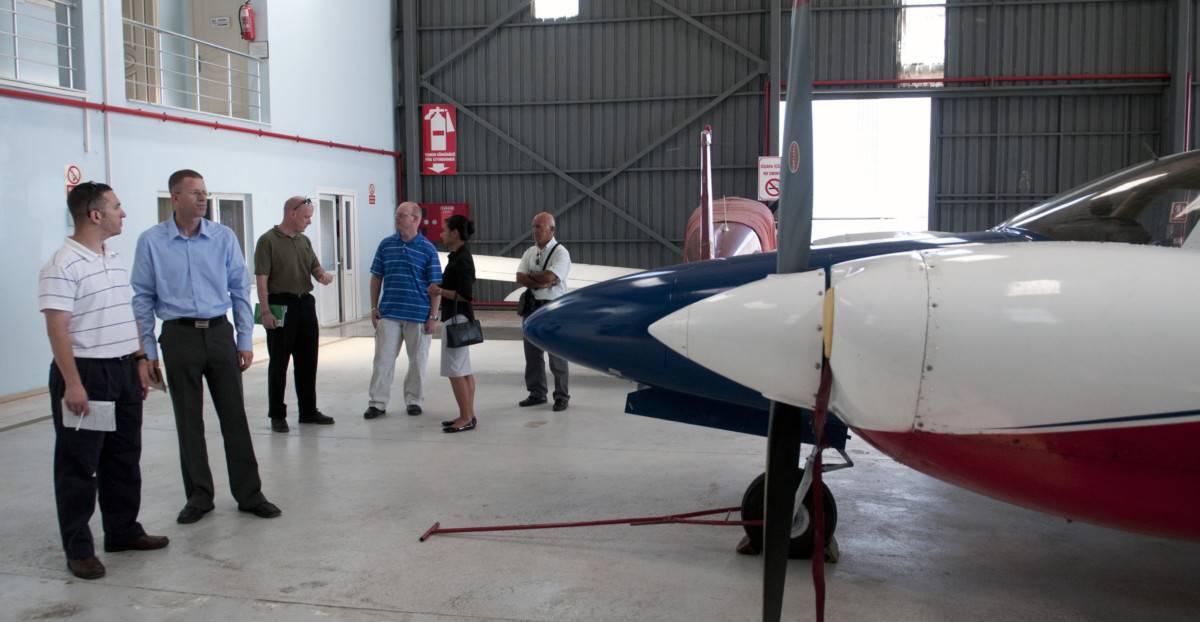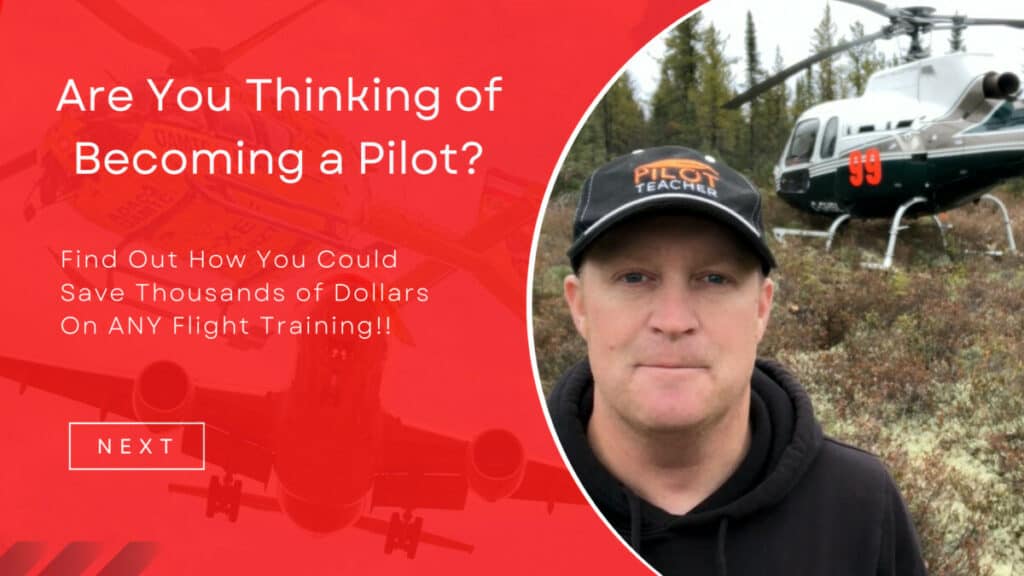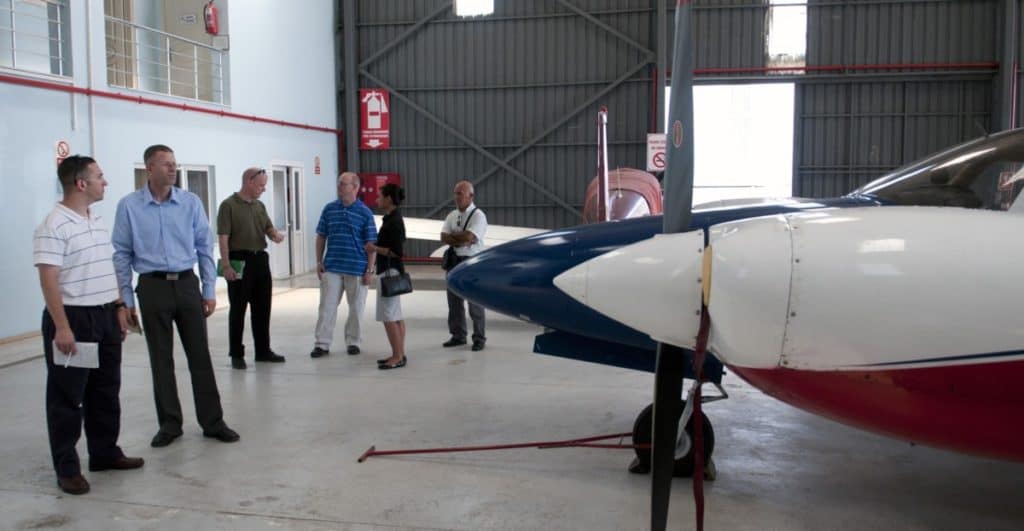
Many years ago when I was looking at which flight school to attend I was looking everywhere and talking to everyone! I read the same old posts, repeating the same information but I lucked out, mostly.
My flight school was great and I loved it but it had some things which had I known about I may have selected a different school.
This article is all about the time-wasting, money-saving tips that I’ve learned over the many years of flying. Some of them may be obvious and some may not. I hope you find at least one that gives you something to think about during your research and selection process!
When Selecting a Flight School These 9 Tips Can Be Very Important!
1. Be Able To Fly Often
This may seem obvious but at a busy school, you may not get to fly every day. If the weather is bad and every student gets canceled, it could be a week before you get in the air again.
I like my students to do one flight and 1 ground theory session a day. This leaves plenty of time to absorb the information, work on any thinking, eat, stretch, socialize, and enjoy the whole experience of flight school.
Schools with lots of students and not many aircraft or instructors can lead to days without flying. Flying every day or at least 5 days a week helps each lesson progress faster without playing ‘Catch-Up’ from a week ago.
2. Visit the School
This is a HUGE part of school selection and it is a must, especially if you are dumping $50,000+ into them. I took this so seriously that I flew from the UK to Oregon for 3 days just to inspect the school, the surrounding town, and the City.
For most students going to flight school will be one of the biggest events in their life and getting a school that not only meets and exceeds your piloting needs, but you need to see how you are treated by the strangers there. The staff, the instructors, the students.
Are you just another face or do you get invited to join in conversations? Do you get that welcoming feeling? Are they worthy of your money? Does the school do any events like student BBQ’s, charity sports events, or team building?
Go for lunch with some students, and grill them on their experience with the school. Would they go there again knowing what they know now?
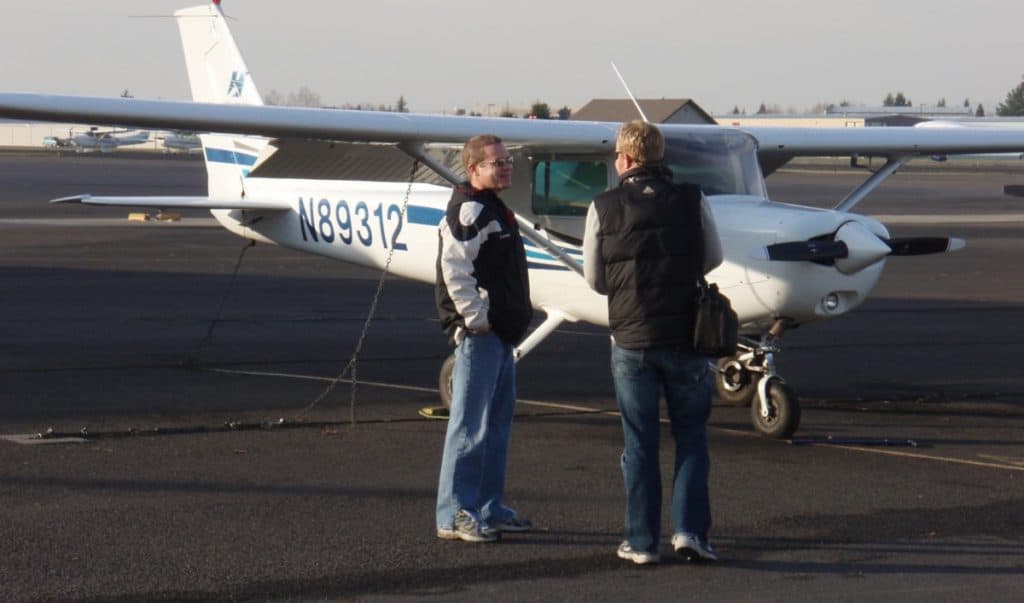
3. Local Amenities
When visiting the school go see some of the student housing. Do they even have student housing? Is it clean, comfortable, and fully furnished? How much is it? How far is it from the school? How far are the grocery stores, recreation facilities, bars, and restaurants? What is there to do for downtime when you need to switch off from flying?
Can you walk or ride a bicycle everywhere or do you need a car? This could be a big expense that needs to be budgeted. Especially if you are coming to the US from abroad. Can you easily convert your foreign driving license?
Your life around school is as important to your mental health as your life in school!
4. Online Booking
Ensure the school has an online booking system so you can control when you fly and do ground, but one thing you have to be careful of is if you block book your flight slots be sure to book them or inform your instructor to book them on all different tail numbers.
If your next months’ worth of flight slots are booked in one aircraft and that aircraft goes unserviceable it could be weeks before you fly again, especially if it’s a very busy school!
I saw this happen to one student and it was a nightmare trying to reschedule all the students and aircraft to accommodate this poor guy. If it wasn’t for a few of the good instructors this kid would have just had to wait!
It’s OK to primarily fly one tail number but be sure to throw in different aircraft to keep you from sitting! The other great thing about an online booking system is that if you keep an eye on it you can jump in and pick up any canceled slots to get extra flights if required.
TIP:
NEVER give a flight school all of your money in one go! Pay for your training as you go or pay it in installments. If they don’t allow you to do this, pick another school! I have seen many a student lose all their money and get no training after a flight school went bankrupt and lost all the student’s money.
5. A Variety of Instructors
I feel it takes around 10 hours for the student and instructor to get to know each other. I had some absolute morons for instructors and back then I was too afraid to speak up for a replacement. Having a school with a good amount of instructors is very important!
Having a good instructor that you gel with can make flight school one of the best parts of your life, or could drive you completely away from aviation if you get stuck with someone you hate!
Remember YOU are their client and YOU are paying for the service. If you feel like after 10 hours you can’t stand your instructor or their teaching methods then go and see the school manager and ask for a different instructor.
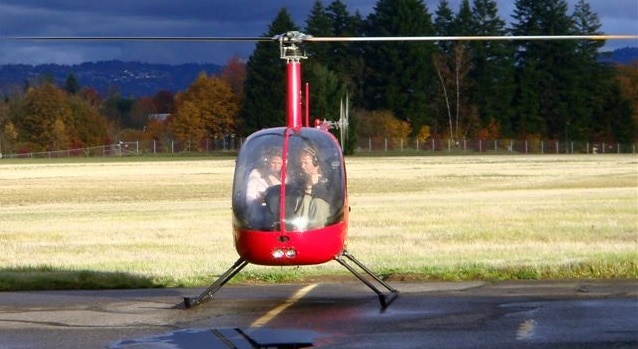
If you spend enough time around the school you will soon see who you think you might gel with, ask their students how they like them, and which instructors they would fly with if they got a chance. Some instructors are there to just ‘Hour-Build & Run’, while others are there to help people reach their dreams. There is a big difference and you will see it!
6. Local Flying Clubs
For many students hour building to get ready for the next certificate can be difficult, especially in a busy school. One of the best-untapped resources is a local flying club. Have a look around during your school research to find ones with the same aircraft you will fly at school.
When you first start school I highly recommend you drop by the local flying club and introduce yourself. If the school is in your hometown and you plan on sticking around for a while, the availability and reduced hourly cost could work wonders for your budget.
Most flying clubs have a joining fee and monthly fees but if you do the math and see how many hours you need to build and work out the costs with all the fees, you could save yourself a good deal of money. If a few of you head to the club you may be able to arrange a deal where 5 of you fly for the price of one membership! Aircraft don’t make money sitting on the ground and if you don’t ask you don’t get!
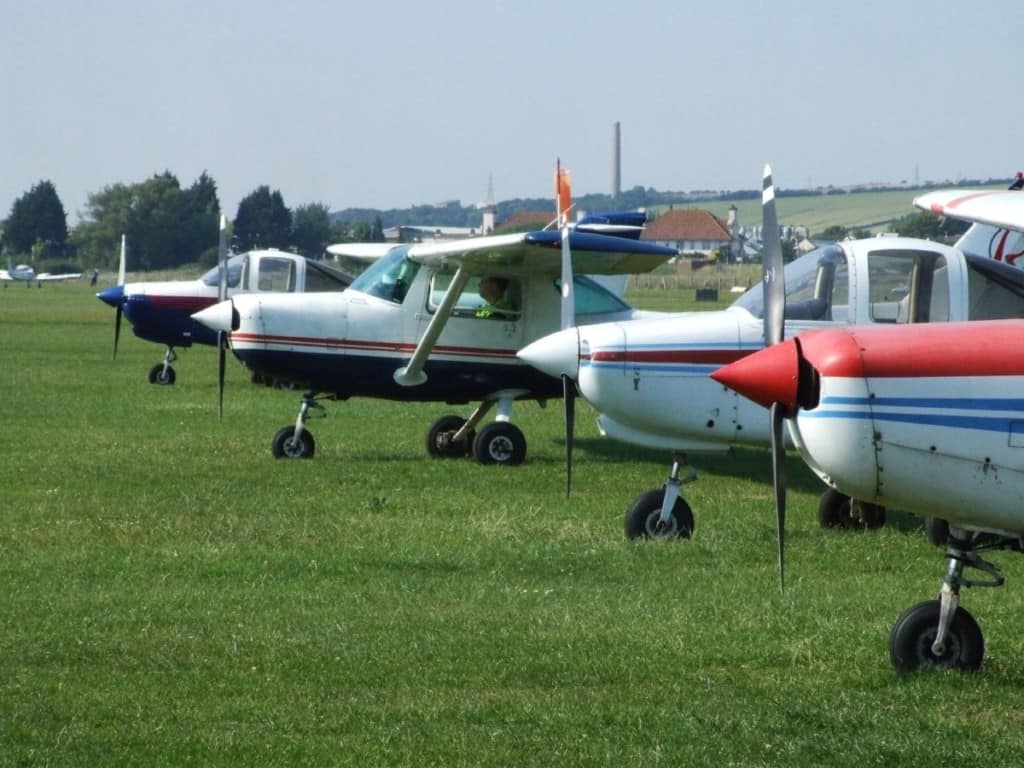
Learn More…
Try These Articles:
* Helicopter or Airplane: Which is Easier To Fly?
* Benefits of Joining a Flying Club: Fly For Less!
7. Number of Classrooms
When you visit a school be sure to look at how many classrooms and One-on-One teaching cubicles they have. This is very important for pre and post-flight discussions and One-on-One ground lessons. At a busy school, if you are unable to find a cubicle, post-flight analysis tends to be done in a hallway or on the apron and it is always rushed and the subject matter is not covered in good enough detail.
One way around this for ground lessons is one that I have seen often. This is one you have to be careful with but it can work really well for you and the instructor if you can come to an arrangement.
Most schools charge the student around $45/hour for the ground lesson and then only pay the instructor around $20/hour. If there are no classrooms free you could both come to an arrangement of paying the instructor $30 directly and have them teach you in your home, bar, coffee shop etc.
I had a heated argument with one school where I was teaching Commercial Ground to a class of 20 students, all of which were paying $45/hour and I got paid $2 more per hour than my regular $21/hour! Guess where all that profit went!
This can save you quite a bit of money but can also lead to problems if the school management becomes aware. If you are just a number at a school where the owner rolls up in a $100K SUV and doesn’t even know your name then it happens a lot. If you are at a small, friendly school, then keeping the money in the school is more beneficial to everyone.
8. Local Annual Weather
Have a look at the annual weather patterns for the school. Are there any periods throughout the year when flying comes to a screaming halt? Does the area get fog for weeks on end? Rain for weeks on end? Tornados or Hurricanes?
Having a variety of weather is great for training, but after weeks of not being able to fly, it can be detrimental. If your training is due to take 6-8 months, look at starting your training after the poor weather season is over.
9. Local Traffic patterns
I’ve saved the best tip until last!!! When you go to a school be sure to ask how many aircraft are flying each block and how many aircraft can be in the airport traffic and training patterns at the same time. After that, ask which are the closest airports you can train at.
At a previous flight school, we could only have 4 helicopters in the airport traffic pattern and 11 were booked for each slot which meant 7 had to go elsewhere. When maneuvers have to be done to taxiways or runways and the nearest airport is a 10 minute flight away, that’s 20 minutes of each lesson wasted just going back and forth. Then what happens if you get there and 5 other aircraft are also in the pattern, then you have to go find another airport! More wasted time and money!
If you total this up and say 50% of your training flights are away from the home airport and 25% of that time is spent transiting that’s a lot of wasted cash and time!
For Example:
150 Hours of Training:
- Cessna 172 = ($135 For Aircraft + $45 for Instructor per Hour) x 150 hours = $27,000 / 50% = $13,500 / 25% = $3,375 Just Transiting!
- Robinson R22 = ($300 For Aircraft + $45 for Instructor per Hour) x 150 hours = $51,750 / 50% = $25,875 / 25% = $6,468 Just Transiting!
When I left that school students were having to show up 3-4 hours before their allotted flight to book the training pattern slots! Not only is this inconvenient but it also wastes study time.
If you can’t regularly train at the home airport, find another school!
This is something you ask the students about when you visit to check out the school, never ask the management! They will always tell you what you want to hear!
** Free Awesome Tool **
To help with your planning feel free to get your copy of this really simple and easy-to-use Flight School Comparison & Budget Planner Tool. It allows you to compare the costs and hour requirements for many different types of pilot certificates for 6 flight schools.
Using this Free Tool will really help you decide which school is going to suit your budget!
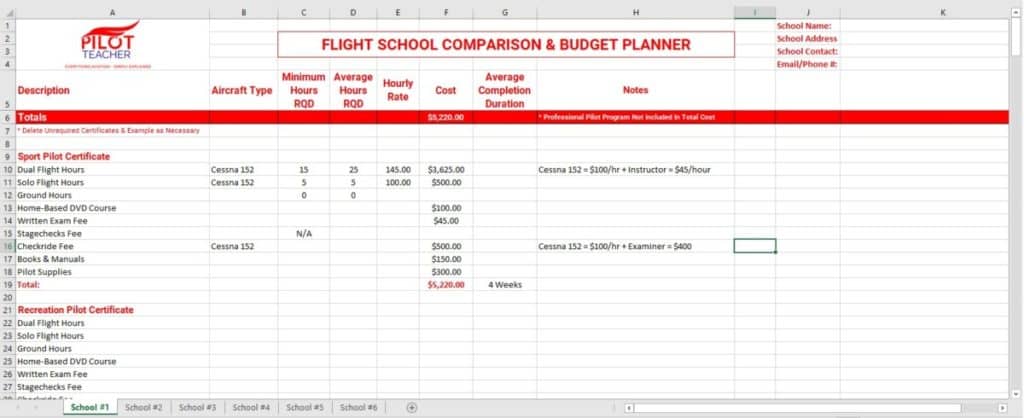

Join My Newsletter & Get Great Tips, Information and Experiences To Help You Become a Superb Pilot!
Learn More…
Try These Articles:
* Flight School Reputation – Does It Matter Where You Train?
* Computer Flight Simulators: Can You Really Learn To Fly On Them?
Some Extra Awesome Tips When at Flight School
1. Lesson Preparedness
The students that show up being the most prepared progress faster, have less stress, and enjoy flight school far more than those that don’t.
After each flight, I always tell the student what we will be doing on the next flight. By going away and learning all about the maneuvers, possible emergency procedures, things to improve on from the last flight, and doing some arm-chair flying (Yes, it does work!) you can really improve the amount that can be accomplished while in flight.
Being ready for the aircraft to land with the previous student so you can instantly jump on and preflight it, fuel it, get your cockpit ready, have the weather checked, bathroom break, water drunk etc, is a great way to ensure the most flight time can be gained from the 2 hour booking slot!
The same goes for ground school. The more time spent going over the last lesson, the more it’s going to cost and the slower the progress will be. Come to the lesson with questions or queries written down and read ahead so you already know a bit about the next lesson.
Eating your own dinner is faster than being spoon-fed!
2. Home Study Variety
No matter how much you love aviation if you are not careful you can get into burnout, especially on a long professional training course. Keeping a variety of training methods in your room will really help keep your study sessions focused and efficient.
Books, DVDs, YouTube, Practice Tests, and Online Study can all make studying easier. If you are struggling to understand how a VOR works from a book, go watch a video or an online training tool. All you need is for the information to ‘Click’ in your brain for each lesson and you will progress very well.
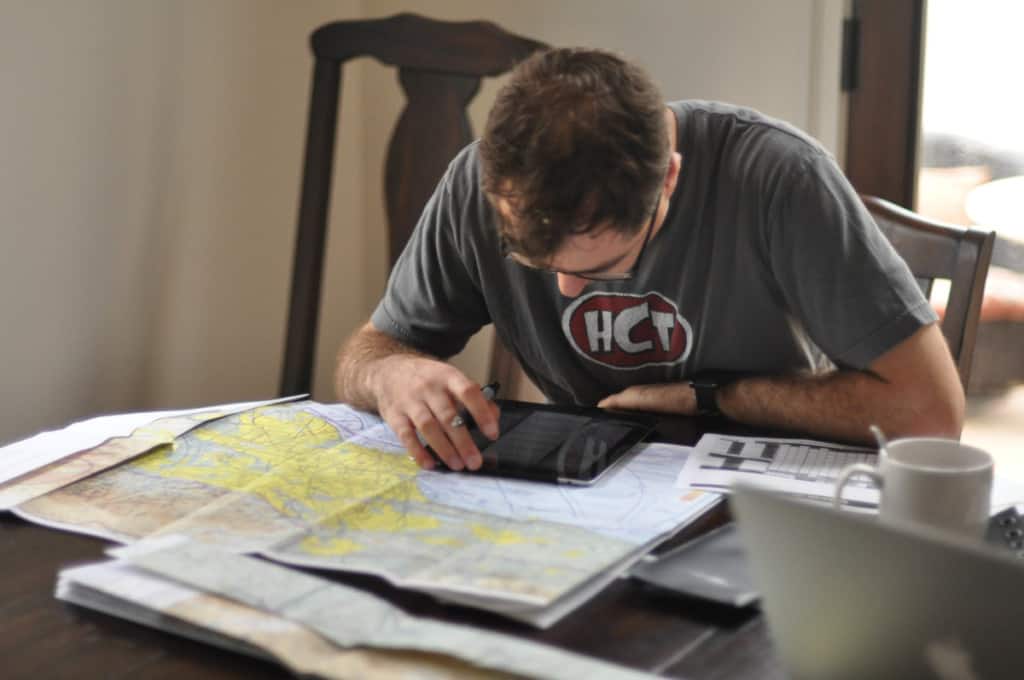
Talk to other students if you can’t picture it or you are facing a wall. All it takes is for one person to explain it in a different manner and you can have your eureka moment! The more you can learn outside of the flight school the cheaper it will be and the faster your ground lessons will go!
3. Used Study Materials
Books can get expensive and when a new student shows up to flight school with a $60K check in their pocket, books and training materials can seem like something to not care about.
I can still remember paying $80 for my Jeppesen Instrument Commercial textbook! I had never paid that much for a book in my life, but I still have it! I’m looking at all my textbooks right now as I type! For some, keeping textbooks are a personal choice. For me, life is a constant journey of learning and after 20 years I’m still learning.
For many students, the second they have passed that exam they want the book gone. This is a great way to get textbooks at a great price! You can save hundreds of dollars buying gently used textbooks and they are always for sale on the classifieds and school notice board!
4. Group Study Sessions
When several of you are at the same point in your flight training it can be really beneficial to get together each week and go over what you have learned. It can be a great way to understand the material and help each other out, but be sure to stay focused.
Having a whiteboard available to draw things out and talk about how it works is really beneficial. I really found group study sessions helpful when training towards my CFI-Certified Flight Instructor Certificate because for 6 months I had been learning it all in my head and now we had to learn how to explain all this stuff, and to do it to students with English as a second or even third language.
By talking to a group you can really improve your understanding and knowledge of a subject and help each other get stuff figured out!
To Finish
I’m sure you have read many other blog posts stating all the same stuff about safety, maintenance, aircraft, programs, etc, but I wanted to give you some of the secret stuff that you only learn after you have seen it!
Picking a flight school is as important as picking a life partner. Get it wrong and it costs a lot and is not enjoyable. Pick the right one and you are in for a harmonious journey and one you will remember for the rest of your life!

